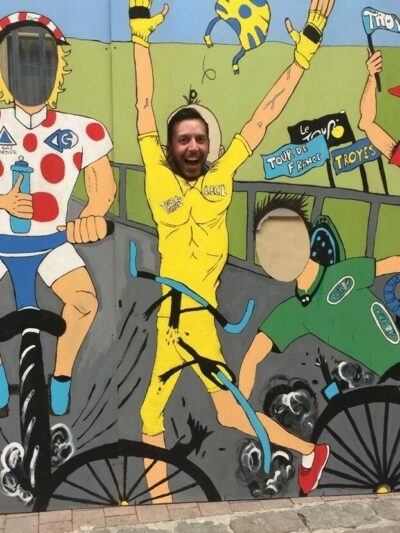5 Questions for a Conneticut-Based Future Teacher from Troyes, France

We’re asking students, recent grads, teachers, and counselors five questions on how languages play a role in shaping personal and professional success…
Meet Christophe—a Master's candidate in Curriculum and Instruction at the University of Connecticut's Neag School of Education, where he previously earned a Bachelor's of Science degree.
1. We’d love to hear a little about your earliest experiences learning language at school growing up in France! What languages did you learn, when did you start, and what were your first impressions as a language student?
As most, if not all French students, I had to take at least two languages starting in middle school, so I decided to go with English and Spanish. I remember my very first experiences as very rewarding. Learning vocabulary and going from 0 to 0.75 on a 0-100 scale felt like a huge accomplishment.
However, English started becoming more and more challenging while Spanish came to me very easily. For that reason, while I still had to take English classes, I put a stronger emphasis on Spanish which means that I would read and listen to the language outside of class. This stronger interest in the language greatly helped me to be able to communicate with my teachers in the target language, which in turn helped me build even more proficiency!
2. What factors would you say most inspired you to consider language teaching as a career?

I have always been a very indecisive person, which is why I am only completing my master’s in my thirties! To be completely honest, I did not consider language teaching until recently, after moving to the U.S.
I wanted to teach, or at least work as an educator very early on in my teenage years. I would always try to help and/or advocate for classmates who would struggle in class.
I truly realized I wanted to teach when I ended up in a so-called “bad class” when I moved to another town, had to go to a different middle school, and chose to opt out of all electives. I realized that incredibly witty, smart, and funny kids could not express their intelligence because of the way the school system was built. After a year during which I didn’t learn much academically (we were too busy being “bad students”), I discovered that I could maybe give my future students a chance to express themselves no matter their backgrounds.
Fast forward a few years, I moved to the U.S. with my wife and saw that I could use my skills as an educator (I hold a degree in social work from France) and a French speaker to teach American kids about my home language and the francophone culture!
3. As a future language educator, could you share with us some of your teaching philosophy about motivating students to learn languages? Why learn languages? What does learning another language mean?
Coming from socioeconomic and cultural backgrounds that are not being talked about very much in world language classrooms, I want to build lessons around “the small things” and “the real people” of the francophone world. I believe that, despite cultural differences, we all share commonalities that can ultimately help us become better intercultural individuals. It seems to me that language teaching is still very much based on rigid and stereotypical content that are not always relevant to students.
As a future teacher, I want to make sure that the material I use for my students is relatable while still expanding their cultural horizons.
Learning another language means to enter a challenging but also rewarding world of possibilities and discoveries.
4. At UConn, you’ve been exploring themes of social justice in education: Why is it important to you to make social justice an integral part of language lessons?
I believe that implementing social justice in the classroom is important to help students become more aware of injustices and ways to fight them. I also think that shying away from it will make the content irrelevant and, as you probably noticed, I am all about making it relevant for the students! Injustices, climate crises, and pandemics are unfortunately part of our daily lives. Additionally, I feel like the younger generations are so much more informed and aware of these issues. However, despite their awareness, they still might lack a deeper understanding on how communities around the world organize to fight injustices and create a more livable world.
5. You recently completed a student teaching role! Could you share with us a memorable anecdote or your biggest lesson/takeaway from that experience?
If I had to choose one takeaway from my very unusual student-teaching experience (90% of it was done remotely from the “comfort of my home” while the students were in the school), I would go with an email a student wrote me at the end of the school year, following my long-term substitute teaching.
In her email she told me: “I know we weren’t the best class but thank you for your positive attitude.”
The student who wrote me this email was always very quiet and had some trouble completing assignments on time or at all. However, I could see a slight change in her behavior throughout the semester. Of course, she did not finish the year with a very good grade, but I want to believe that “my attitude,” as she said, will help her down the road. In other words, this simple email showed me that even if we don’t see the results of all the effort we put out there, they will eventually inspire our students.
BONUS QUESTION
How would you describe some of the differences (or similarities!) between attending university in France and in the U.S.? What has been your favorite part of your experience as a student in the U.S.?
College in France is free… but it comes at a price! Being a first-generation college student, I had no idea what to expect. On the other hand, growing up in France I knew better than to expect a grade higher than a 15 out of 20. But after putting so much effort during my very first semester, I did not think I would only barely pass with a 10 out of 20! French universities are very demanding and a lot more punitive than American ones (at least in my opinion!).
My experience in American universities reminded me of my experience at the school of social work in France. In both institutions, I felt like the voices of students were valued and that instructors worked hard to build students’ confidence.
What's next?
We asked Christopher what he most looks forward to as a language educator when he thinks about his future classroom. In his words:
During the education program, we discovered the concept/pedagogy called translanguaging. In brief, it is a pedagogy that invites learners to use the entirety of their linguistic repertoire. Put more simply, it means that the teacher strategically organizes their lessons so students can use all the languages they know while still learning a new one. Translanguaging is deeply connected to multilingual ecology, where classrooms become a space where all languages are valued.
Although I will be certified to teach French, I am looking forward to creating a truly “World Language” classroom where students not only learn the language I will teach, but all the languages spoken in their communities.
Check out our Connect with French and Language Programs & Funding pages to explore language scholarships, university programs, testimonials, and more! And, as always, visit @LangConnectsFdn on social media to share your story with us.
